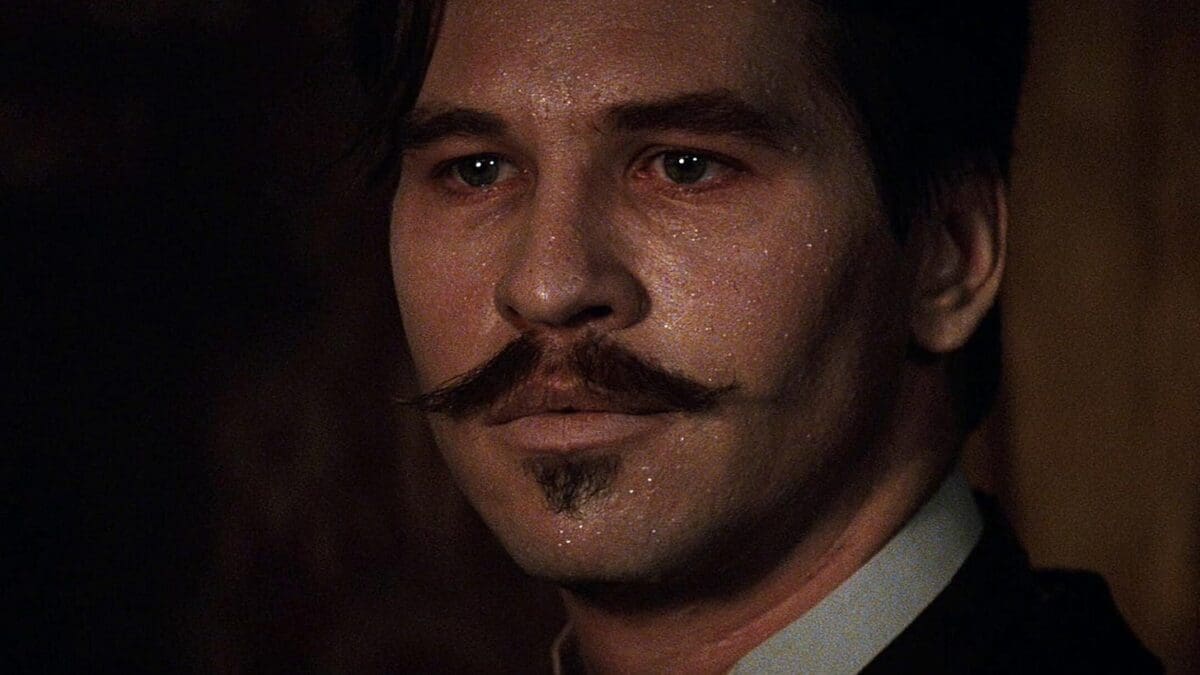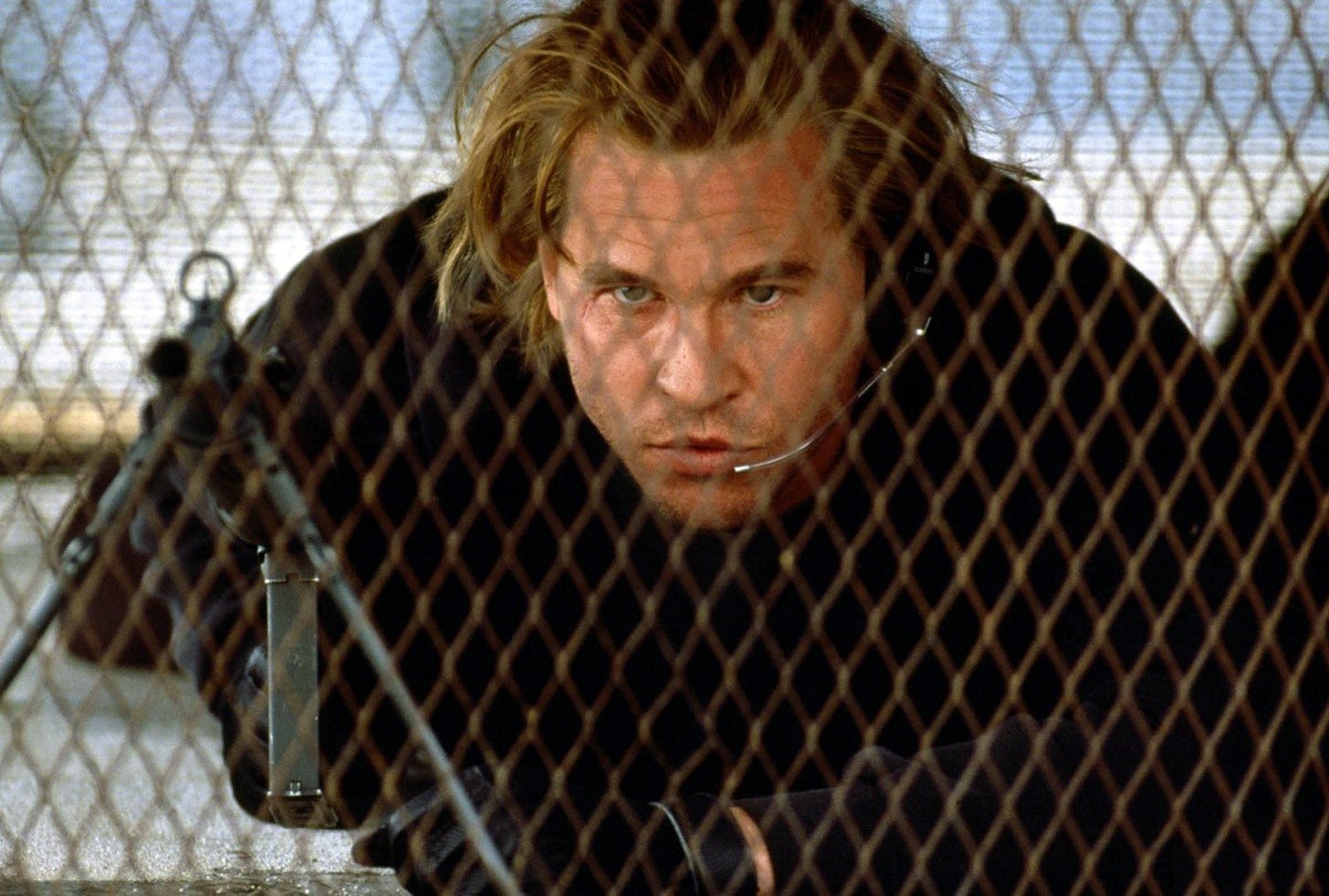
Canada’s Inequality Is Driven by Billionaire Wealth
April 2, 2025
Defending the Labor Theory of Value
April 2, 2025VAL KILMER IS ONE OF THOSE ACTORS I sometimes think of as a great supporting lead. Which is to say that he had leading man energy and wasn’t quite a “character actor”—he had immense range and a chameleonic quality, but no one on this planet ever said “Oh yeah, that guy, what’s his name” about Val Kilmer—and yet his best, most memorable work rarely came in the films where he was first on the call sheet. He excelled at stealing the spotlight in bit parts, making other men’s movies his own.
You see it all the way back in Top Gun, where his Iceman is the coolheaded pro foil to Tom Cruise’s hotheaded Maverick. The most memorable moment in that whole film isn’t Cruise belting out “Great Balls of Fire” or wooing Kelly McGillis; it’s Kilmer chomping his teeth, warning that Maverick is dangerous. This is why the most moving sequence of Top Gun: Maverick comes when Iceman, now an admiral, tells Maverick that he needs to forgive himself for Goose’s death, that he needs to let it go and do what must be done to keep his compatriots and his country safe.
The middle of the 1990s provides the most proof for this thesis. Who else could play Batman—Batman!—and have it serve as his third-most-memorable film in a three-year period? Yet that’s precisely the case of Batman Forever (1995), a movie few look at fondly compared to Tombstone (1993) and Heat (1995). It is within these films that his greatness as a supporting lead is most pronounced, in no small part because of the caliber of star that Kilmer was arrayed against.
Tombstone has one of the greatest movie casts ever assembled—Kurt Russell, Sam Elliott, Bill Paxton, Michael Biehn, Charlton Heston, Stephen Lang, Thomas Haden Church, Powers Boothe, Michael Rooker, Billy Bob Thornton, and I could keep going—and Kilmer blows them all off the screen with his work as Doc Holliday, the gaunt, ghostly tubercular gunslinger. Russell’s Wyatt Earp is the hero; he gets his revenge and the girl and rides off into the sunset to become an early Hollywood consultant shaping his own legend. But Holliday is the bleeding heart of the film, a tragic figure in his own way, a man so sure of his talents that he can’t help but get people killed. Tombstone is a stone-cold basic-cable classic and an ur-Guy Movie, and I bet if you ask guys which guy in the movie they’d most like to be seen as, nine out of ten pick Kilmer’s lunger. His taciturn “I don’t”in this scene says more about male friendship than a whole page of monologue could.
The cast of Heat is no less impressive, though more succinctly summed up: Pacino vs. De Niro. And yes, both De Niro and Pacino deliver master class–caliber performances. But again, in this movie about alpha men and their relationship both to excellence at crime and incompetence at home, Kilmer is the bleeding heart of the film. He’s the one criminal who is able actually to fulfill Neil McCauley’s (De Niro) axiom: “Don’t let yourself get attached to anything you are not willing to walk out on in 30 seconds flat if you feel the heat around the corner.” Few moments in film are as heartbreaking as when Kilmer’s Chris clocks his wife giving him the “run” signal and his face shifts from loving relief to the cold realization he’ll never see them again. As much as everyone loves the physicality Kilmer demonstrates in the Hollywood shootout scene—and as great as that is—it’s this moment of face-work that demonstrated why he was one of the best.
I could go on in this vein—Gay Perry is the funniest part of Shane Black’s Kiss Kiss Bang Bang, Robert Downey Jr.’s comeback vehicle that helped him land Iron Man; I don’t remember a single thing about The Snowman except for Kilmer’s odd, very clearly hacked-apart-in-the-editing-bay performance as the incredibly named Gert Rafto—though hopefully you take my point.
I don’t want to undersell Kilmer’s talents as a leading man; perhaps one day the boutique Blu-ray firms will get around to crafting a proper 4K release for David Mamet’s Spartan (2004), the physical and lyrical rhythms of which almost perfectly suited Kilmer’s ability to abruptly shift between “still” and “high-order violence.”
I’d like to end with a reminder that the documentary Val—which features a great deal of footage that Kilmer shot himself during his career, paired with an almost-haunting look at life following treatments for cancer that robbed him of his voice and killed his acting career—is a must-watch. Not just because of the archival footage, though that stuff is always fun. But because it shows Kilmer’s poignant side, the way the video he has shot over the years helps him tell the story of his own life, not just in the world of acting but with his kids, with himself. Kilmer was a thoughtful guy and a true artist (read his memoir I’m Your Huckleberry for evidence of that), which is probably one reason he slid better into supporting roles where, unburdened by the demands of leading-man status, he could do work that was a little off-kilter and thus more interesting. Rest in peace.
Great Job Sonny Bunch & the Team @ The Bulwark Source link for sharing this story.







